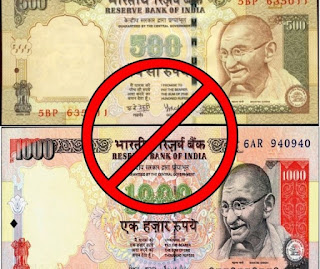Demonetization: Axe on Co-operative Banks – Need to strengthen their credibility
With move to demonetize Rs.500 and Rs.1000 notes by the Modi government had a strange fall out when Cooperative Banks which are the backbone of the rural economy, have been paralyzed with the ban of accepting the old currency that are no long legal tender now.
Cooperative banks have been the trusted centres to bank for millions of farmers and middle, low-income people for long. Despite all their negative sides, these institutions are known to offer them easier loan and deposit products and hence are the favourite institution for the poor. Restricting them to conduct business, as happened post-demonetization, will have major impacts on these banks. It damages the business of cooperative banks and their financial health.
Operations at 370 district central cooperative banks (DCCBs) and over 93,000 primary agricultural credit societies (PACS) have been severely hit with the Reserve Bank of India (RBI) slapping restrictions following the demonetisation of Rs 500 and Rs 1,000 notes.
In a direction to the banks, RBI says that they have advised the Urban Cooperative Banks through its Regional Offices and the State Cooperative Banks through National Bank for Agricultural and Rural Development (NABARD) of the need to ensure strict compliance with the instructions issued with regard to exchange of specified bank notes as also deposit of such notes into the accounts of their customers.
But there were reports that some cooperative banks were not strictly adhering to the instructions issued in connection with the withdrawal of legal tender status of the existing Rs 500 and Rs 1000 bank notes (specified bank notes).
No doubt, the people are initially facing problems in exchanging notes after demonetization but at the time of announcement of demonetization over the television, there was no panic at all whosoever heard it despite the fact that the ban has impact on the day today functioning and putting down the graph of sales of each businessman irrespective of sale and purchase capacity.
The Reserve Bank of India’s restrictions drive during the demonetization for the Cooperative Banks who have provided credit to farmers and three-tier banking system is one of the largest in the country.
Like the Railways, the Cooperative Banks have also been described as the lifeline of the state’s economy and there had been protests following the RBI decision and the cooperative sector went on strike last week.
In fact, it is a discredit to the Banks when the centre gave money transaction nod to post offices and petrol pumps but not to the cooperative banks. It looks to be a part of conspiracy to extend benefits to the new-generation banks to widen their presence in the market and taking a tough stand on black money that the cooperative banks have to fall in line and adhere to the RBI guidelines if they wished to survive.
At the same time, the people are happy with the decision of the government as Modi has cut the wings of corrupt who hoarded money under their beds. They have lost their sleep and not the poor who are sleeping peacefully.
One the educated farmer pointed out that when the operation of bank stands approved by the RBI, there is no question of banning the Cooperative Banks to stop accepting the old notes in the accounts.
In this process, the farmers are upset with the inactivity of their cooperative banks. They don’t know where to go for their small needs and financial emergencies and have been forced to stand in queue at nationalized banks. The banks have no time to open new accounts and what to say of transfer of funds from Cooperative Banks, depositing the small amount of cash with them and then withdrawing which is a time consuming process and more so, they are busy with currency conversion.
The government must allow Cooperative Banks to function or farmers which has been their source of funds for decades and have suddenly become invalid.
Dr.Anand Rai Vyapamm scam whistleblower has rightly pointed out that this step was taken because some cooperative banks are dominated by politicians and were reportedly being used to launder Rs.500 and Rs.1000 notes.
But at the same time, the ban will completely break the back of the rural community in Punjab already reeling under massive cash crunch particularly at a time when the sowing season is on. This will further push the rural community in particular, to the brink of unprecedented disaster.
With the directions of banning cooperative banks not to make any transaction of old currency notes, the banker would like to know as to whether we are moving from a democracy to a dictatorship.
There is a need to make in-depth study over this move for future planning and strategies about the reaction of the people and the management forbidding Cooperative Banks from accepting the banned notes.
In fact, these days were crucial for farmers as it was the sowing season and farmers needed money for seeds, manure and fertilizer. But there had been not even a single case of fake currency found out of the deposits in crores by the Cooperative Banks in commercial banks. It is not understood as to why the cooperative banks have been directed to stop receiving defunct notes while a large number of rural consumers were attached with them.
The discrimination towards the Cooperative Banks will put the credibility of the banks at stake. The RBI and RBI and the Central Government should have taken this into consideration before meting out discriminatory treatment.
What I feel is that instead of penalizing or punishing the corrupt rich, the whole demonetization affair seems to be targeted at the country’s poor, who are finding it difficult to carry on in the absence of ready cash to meet their day-to-day needs.
Frankly speaking, the whole chaos will takes away the trust of common man from cooperative banks. Customers will think twice again before depositing their hard-earned money or taking a loan against their property from a local cooperative bank.
Due to uncertainty, the people will now be scared to park their money in future in these banks due to uncertainty as their credibility has also taken a hit. The current crisis could take the shape of a permanent mutilation if cash crunch continues for a few months and it will take a long time for them to recover.
Instead, the government should have tried to strengthen the infrastructure and capabilities of these banks instead of bringing them on the verge of collapse.





